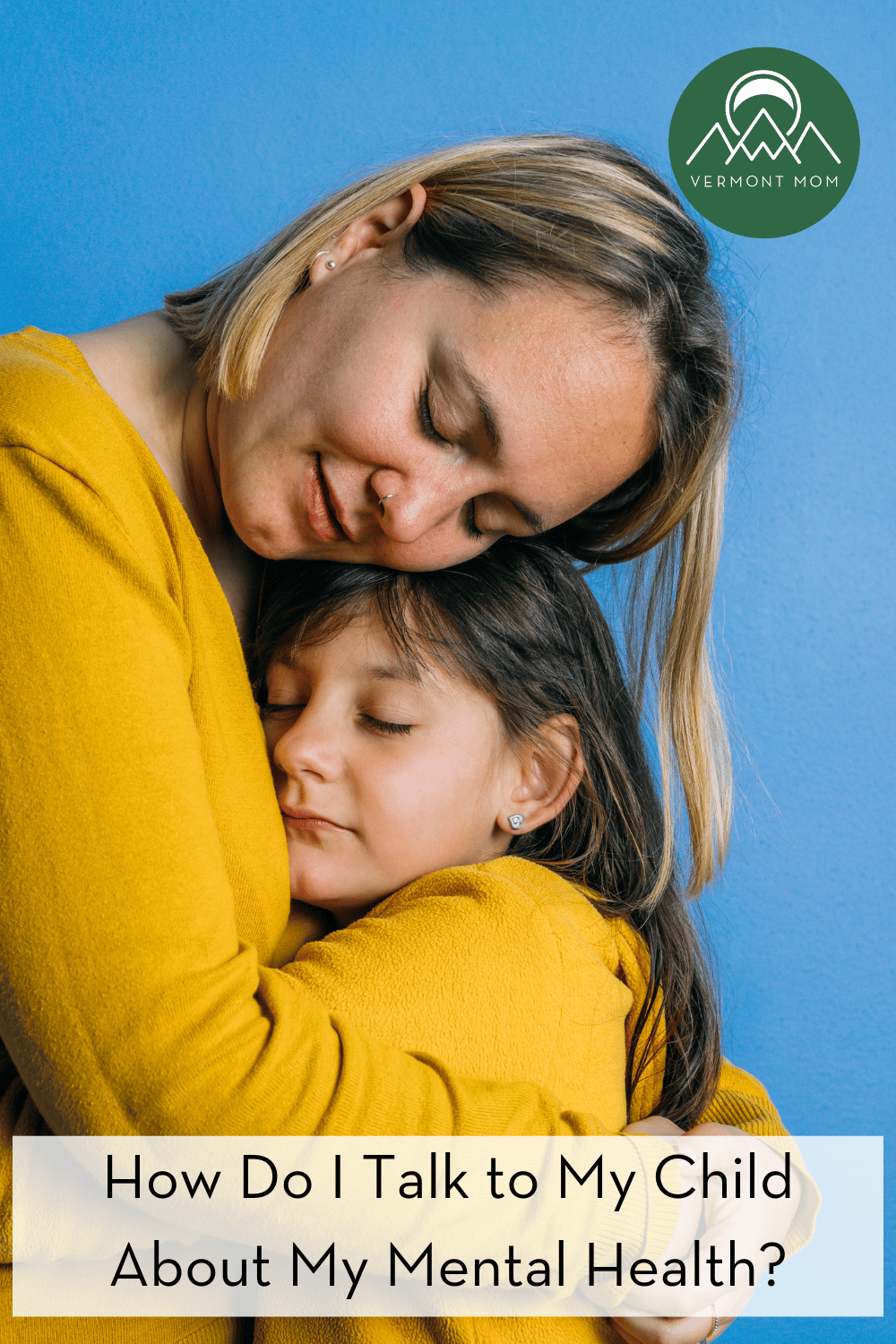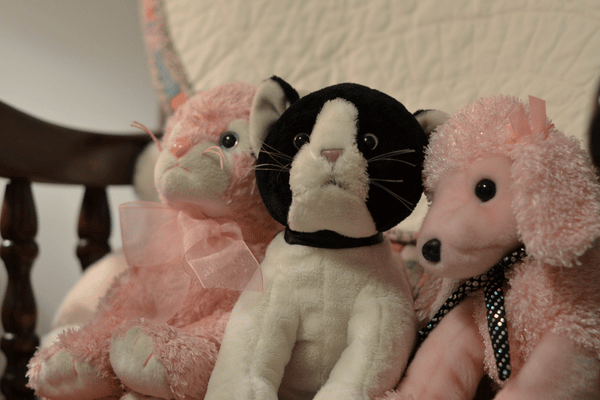My daughter lined up her stuffies on the table at IHOP: a small plush leopard, a black panther, and a tiger. She then drew a line with a green crayon on a maze on the children’s paper menu. At one end of the maze was a bottle of maple syrup. Its object destination: a steamy stack of pancakes. She’s good at mazes, and I watched her crayon move gracefully around the dead ends and switchbacks. I thought, If only life were that easy, or if parenting were that easy, or if the conversation I was working my way up to were that easy.
How do I talk to my child about my mental health condition?
My first instinct is to just not talk about my mental health. That’s how most of us with psychiatric illnesses survive—at least those for whom symptoms are manageable, anyway.
While mental illness can be an invisible disability, sometimes there is no choice in how and when the symptoms manifest. But for the most part, I have gotten by with what a therapist once told me was “assumed competence.” Basically, I’ve faked it. I’m one of those “high functioning” folks who appear to have their crap together but am actually dying a little on the inside. Through isolation and closeted suffering, I manage to pass as normal, and avoid judgment and stigma.
I pretend I am okay, but it comes at a cost.
Why do I want to burden my kid with the disclosure of my mental illness, something that can be complex and distressing for her? Fair question. In general, I believe in letting kids be kids. I believe that adult problems should not become kid problems, and we should not unload our issues on them.
That said, I also believe that we don’t give kids enough credit for how intuitive and sensitive they are. They may not always understand why mommy’s sad, but they sure as heck can feel it in their bones. The risk of not naming it for them is that they may attribute their own meaning. And because kids are inherently egotistical (not in a bad way, just that their world naturally evolves around them) they most often assume guilt or responsibility when something goes wrong.
My mental health struggles are the last thing I want my daughter burdened with.
So therein lies the conundrum. How do I name my mental illness so that my child can be validated in her own experience of my symptoms, and relieve her of any notion that she is at fault, without causing her stress and worry? Where is that green crayon? How do I get to that steamy stack of pancakes from here?
My heartbeat hastens, and I take a sip of my iced tea. She can sense something is up. I look into her almond-shaped brown eyes. Three other sets of eyes are also staring at me (her stuffies). I take a deep breath—
And I chicken out. My daughter is antsy and kicks the leg of the table. She slides the paper menu across the table, indicating it’s my turn in Tic Tac Toe. I place an “X” arbitrarily on the grid. She grins and laughs somewhat maniacally, drawing a line with her crayon down her row of “O’s”.
I win.
I am beginning to feel like a failure as I lose confidence in initiating a conversation with my kid. I question if I am doing the right thing.
“I have to pee,” she announces. I watch her walk to the restroom and guard the door with my eyes, like the helicopter parent I am. I have a memory of myself when I was her age, going to the bathroom alone in a restaurant.
But my motivation was to close a door between myself and my family, so they did not know my awful secret: I was pathologically preoccupied with my own death. I was eight and could not stop obsessing over my mortality. I was in constant terror, with a running mental list of all the ways in which I would—at any moment—meet my end. I escaped to the bathroom and pressed my face against the mirror, opening my mouth wide and staring at the uvula at the back of my throat. While at the table, my throat felt funny, tight. I panicked, succumbing to one of my frequent fears that my throat would close. I watched my pulse at the back of my throat, my breath fogging the glass. I took deep breaths over and over until I was somewhat satisfied that I could get enough air.
My family had no idea I was dying. That was the worst part. They called them panic attacks. My pediatrician said I had depression and anxiety. I couldn’t explain my conviction that my death was imminent and lonely and unavoidable.
 Part of my motivation to talk to my child about my mental health struggles is to create a safe space in which she is always welcome to share her deepest heartaches. I want to initiate a judgment-free zone, a validation corner, an open and ongoing dialogue about mental health and illness, so that not only will she never have to suffer in silence, but so she can also continue to be the compassionate and open-minded kid she is.
Part of my motivation to talk to my child about my mental health struggles is to create a safe space in which she is always welcome to share her deepest heartaches. I want to initiate a judgment-free zone, a validation corner, an open and ongoing dialogue about mental health and illness, so that not only will she never have to suffer in silence, but so she can also continue to be the compassionate and open-minded kid she is.
I want her to know that while psychiatric illness can look like the disheveled man on the corner talking to himself, it can also look like me, her mom—a woman who holds down a job, loves her kid, and (mostly) seems okay. I want her to believe that there needn’t be any shame in being different; there shouldn’t be disgrace in vulnerability.
Like most people with anxiety, I perseverate on just about everything, but especially the idea that mental illness can have a genetic component, and that having a parent with a psychiatric illness increases the chances the child will too. The nature/nurture phenomenon aside, this world—with climate change, gun violence, racism, etc.—is only getting harder, especially for the next generations. Even without a genetic predisposition, the likelihood of developing mental illness is high.
I also know I am not alone; in a survey of parents, eighteen percent reported having a mental illness. Yet, I feel so damn alone. Writing this helps. I want other parents who struggle with their mental health to know that I am here too. I hear you. I see you.
Undoubtedly the worst fear I harbor is that someone will deem me an unfit parent, simply because my daughter may see me struggle from time to time. Some days I am more irritable than others; some days I need a two-hour nap before I can give her my full attention; some days I bite my nails or pick at my skin and stare off at nothing because I am dissociating while my child is trying to talk to me.
And, some days I hold her hand as we run into the lake together, laughing and splashing and falling into the singular moment like it is the only one that ever mattered.
All the days, I do my best. Like any parent, I love my child fiercely.
When she gets back to the table, I clear my throat and begin.
“You know how I take medicine every day? You know how I take a lot of naps? And sometimes I lose my temper?”

You know how sometimes our bodies get sick, and we have to take medicine?
My daughter, who had been shifting her body and eyes around in obvious discomfort, finally paused. Her eyes widened, as though something finally resonated, and she exclaimed (loudly):
Wait, you’re sick in the brain?
The woman at the table diagonal to us spit out her orange juice. She and her partner covered their faces to hide the laughter into which they uncontrollably dissolved. My face turned hot. Suddenly I was my younger self again, with the urge to run to the bathroom and hide. My daughter meant no harm, and even in the moment, I could appreciate the humor in the situation. But that didn’t stop the shame and embarrassment from flooding over me.
“Kinda”, I said, forcing a smile. “But the most important thing to know is that whenever I am not feeling well, it is never your fault, ok?”
The server plopped down a steamy pile of pancakes topped with whipped cream and sprinkles in front of my daughter. She reached for the maple syrup.
“Did you hear me?” I said, “It is never your fault, ok?”
“Okay.” She shrugged, and then licked her lips as she poured the syrup over the pancakes.
And just like that, I’d found my way through the maze.

“How is it?” I asked my daughter.
“Good” she said, grinning with a mouthful of pancake.
The three stuffies on the table—the leopard, panther, and tiger, still stared at me with their judgy, beady eyes. Tough crowd, I thought.
I reached for the syrup, wondering if I’d done the right thing. There is no way to know.
Parenting is a maze through which we all must pass, but parents with mental illness have a harder path to pave.
The following sites may help parents talk to their child(ren) about mental illness:
https://www.nami.org/Blogs/NAMI-Blog/November-2018/Talking-to-Kids-About-Mental-Illness
https://www.heysigmund.com/how-to-talk-to-a-child-about-mental-illness/
Pin this post and be sure to follow Vermont Mom on Pinterest!











